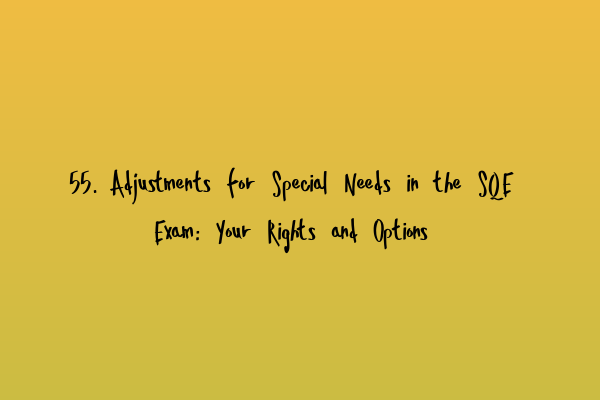Adjustments for Special Needs in the SQE Exam: Your Rights and Options
Introduction:
Welcome to SQE Exam Law! In this article, we will discuss an important topic that affects many aspiring solicitors – adjustments for special needs in the SQE exam. We understand that each individual is unique, and some may require accommodations to ensure a level playing field during the examination process. We will explore your rights, options, and the support available to help you succeed. If you’re interested in learning more about other aspects of the SQE exam, make sure to check out our related articles, such as “24. Unlocking Knowledge with SQE Webinars: Expert Insights at Your Fingertips” and “17. Review of SQE Course Providers: Choosing the Best Fit”.
What are Adjustments for Special Needs?
Adjustments for special needs refer to the accommodations or modifications made to the SQE exam process to ensure fairness and equal opportunities for candidates with disabilities or specific requirements. These adjustments are designed to remove any potential barriers that may prevent candidates from demonstrating their true abilities during the exam.
Your Rights:
As a candidate with special needs, you have the right to request reasonable adjustments for the SQE exam. The Solicitors Regulation Authority (SRA) recognizes its legal responsibility under the Equality Act 2010 to provide access arrangements that do not disadvantage any candidate due to their disability or specific needs.
Types of Adjustments:
The SRA offers a range of accommodations to cater to individual needs. Some common adjustments include:
1. Additional Time:
If you require more time due to a disability, medical condition, or any other reasons, you may be eligible for additional time during the exam. This extension allows you to complete the exam without feeling rushed or overwhelmed.
2. Separate Room:
For candidates who are easily distracted or have conditions that may cause distress in a crowded environment, a separate room can be provided to create a more comfortable and focused setting.
3. Assistive Technology:
The SRA recognizes the importance of assistive technology in enabling candidates with special needs to perform at their best. Candidates may be allowed to use screen readers, voice recognition software, or any other assistive tools required to take the exam effectively.
4. Rest Breaks:
Candidates who have medical conditions or disabilities that may require regular breaks can request rest breaks during the exam. These breaks provide an opportunity for you to regroup, recharge, and maintain concentration throughout the exam.
5. Personal Reader or Scribe:
If your disability hinders your ability to read or write fluently, you can request a personal reader or scribe who will read the exam questions aloud to you or write down your answers. This accommodation ensures that your answers accurately reflect your knowledge and understanding of the subject matter.
Requesting Adjustments:
To request adjustments for special needs in the SQE exam, you must complete and submit the Disability Adjustment Request Form to the SRA. It is crucial to provide relevant supporting documentation from a qualified professional, outlining the nature of your disability or specific needs. This documentation will help the SRA assess your request and determine the most suitable adjustments for you.
Timeline for Requests:
Ideally, you should submit your request for special needs adjustments as soon as possible to allow sufficient time for the SRA to review and make arrangements. The SRA recommends submitting your request six months before the exam date. However, they do accept requests after this deadline, but it may be more challenging to accommodate last-minute requests.
Confidentiality:
Rest assured that all information regarding your special needs and adjustments will be treated with the utmost confidentiality. Only the relevant staff involved in the administration of the exam will have access to this information, ensuring your privacy is respected.
Conclusion:
At SQE Exam Law, we firmly believe that every candidate should have equal opportunities to demonstrate their abilities during the SQE exam. If you require adjustments for special needs, you have rights, options, and support available to help you succeed. By understanding the process, requesting adjustments on time, and providing the necessary documentation, you can ensure a fair and inclusive examination experience. If you found this article helpful, don’t forget to check out our related articles, such as “4. Unveiling the SRA Syllabus for the SQE” and “31. Conquer the SQE: Insider Tips and Study Tricks for Success”. Remember, your success is our priority!
[Grading System in SQE: Understanding How Exams are Evaluated](https://sqe-exam-law.co.uk/grading-system-in-sqe-understanding-how-exams-are-evaluated/)
[24. Unlocking Knowledge with SQE Webinars: Expert Insights at Your Fingertips](https://sqe-exam-law.co.uk/24-unlocking-knowledge-with-sqe-webinars-expert-insights-at-your-fingertips/)
[17. Review of SQE Course Providers: Choosing the Best Fit](https://sqe-exam-law.co.uk/17-review-of-sqe-course-providers-choosing-the-best-fit/)
[4. Unveiling the SRA Syllabus for the SQE](https://sqe-exam-law.co.uk/4-unveiling-the-sra-syllabus-for-the-sqe/)
[31. Conquer the SQE: Insider Tips and Study Tricks for Success](https://sqe-exam-law.co.uk/31-conquer-the-sqe-insider-tips-and-study-tricks-for-success/)
